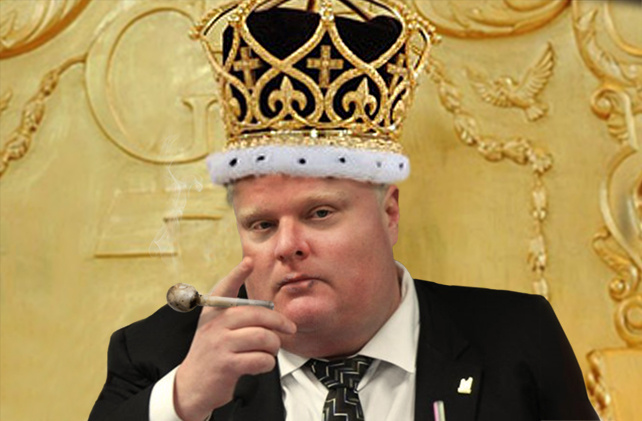Pope Francis might be Time magazine's person of the year, but for Canada, there can be little doubt who our main noisemaker has been. Toronto's mayor, Rob Ford, with his acknowledgments of crack smoking, drunken stupors, driving while under the influence and socialising with drug dealers, has made Canadians cringe in an unexpected way.
Consider that Canadians view much of the world through American media, which places us in a very odd, existential state: we experience much of the world from the perspective of a country that barely knows we exist. When Canada does make the news, either as a Simpsons one-liner or a news story about some extreme weather, it sets off a collective frisson – a brief but thrilling sensation of being acknowledged.
Ford's ongoing fame is that much more agonising, given its epic scope. He has become one of the most famous Canadians in the world, attaining the kind of recognition usually only granted to one of our citizens once they have left the country, like William Shatner, Celine Dion or Justin Bieber.
But Ford's notoriety, which now includes the opening sketch for Saturday Night Live and a New Yorker cartoon, is horrifying to Canadians for another reason. It's the terror of recognition. Sadly but truly, Ford has become the very personification of what Canada has become.
This is difficult news for non-Canadians to digest. After all, many, if not most of you got your impression of Canada through Michael Moore's hugely popular documentaries: we are kind, gentle people who don't lock our doors at night, believe in universal healthcare and gun control and stayed out of the invasion of Iraq.
As some critics have pointed out, our prime minister, Stephen Harper, has remained remarkably silent on the Ford debacle. Harper needs the support of much of Ford's pugnacious voter base, many of who remain staunchly loyal despite the snowballing scandals and gaffes. (Last week, in a TV interview that can only be described as ludicrously sycophantic, ex-con Conrad Black spoke to Ford, who insinuated that a reporter covering his story might be a paedophile. The reporter has served him with a libel notice.) While different in their public demeanour, Harper and Ford are flip sides of the same hard-right coin.
And that makes the image of Ford all the more unsettling. What was once Canada the cool, the country a 1991 Economist cover story called the "post-modern nation-state", has now devolved into a rightwing hellhole. Ford was elected in 2010, one year prior to Canada's Conservative party winning a majority in the national parliament. Since then, Harper, a man who once referred to global warming as "a socialist conspiracy", has pushed Canada's policies sharply to the right.
Canada now has tough-on-crime legislation that includes strict minimum sentences – enacted despite the advice of some American Republican lawmakers, who pointed out that similar legislation south of the border has been expensive and ineffectual. Harper moved to dismantle the long-gun registry, which was brought in after a brutal 1989 mass shooting left 14 women dead at the hands of a deranged gunman. The registry was ended despite the pleas of victims-rights groups and police officers, who almost unanimously supported it.
But Canada's ideological reversal of fortune is perhaps most devastating when one considers environmental issues. Under the previous Liberal government, Canada had been one of the key architects of the Kyoto protocol; Harper's Conservatives officially withdrew Canada from the protocol, and instead are championing Alberta's tar sands, a development many predict will have a catastrophic impact. In an announcement in November that was eclipsed by the Ford soap opera, the Washington, DC-based Center for Global Development ranked 27 countries in terms of their commitment to environmental protection. Canada came in 27th.
Adding to Canada's woes is the recent proposed legislation in Quebec – usually the most progressive province in the country – that would ban turbans, kippas and hijabs from being worn by government workers. Quebec politicians insist the Values Charter, as it has come to be known, will unify citizens by enforcing secularism. But racial and religious minorities see the move as discriminatory and divisive.
Making this a bone-deep trauma is the fact that Harper's Conservatives won their majority with only 39% of the popular vote. The votes between our moderate party (the Liberals) and leftwing party (New Democrats) meant that the sanity vote was divided. It could be likened to the American presidential election of 2000, when Bush managed to win via the electoral college system, despite the fact that Gore won the popular vote.
Each time Ford appears in the media, it's another eerie reminder of what we've become: crude, swaggering, bungling, irrational and mendacious. We've reached that staggering moment in a brilliant horror film when our protagonist realises the truth: Rob Ford is the New Canada. He is us.
Sadly, Rob Ford epitomises what Canada has become
With his crack smoking and drunken misbehaviour, Toronto's mayor personifies our crude, swaggering, bungling New Canada

























Laissez un commentaire Votre adresse courriel ne sera pas publiée.
Veuillez vous connecter afin de laisser un commentaire.
Aucun commentaire trouvé